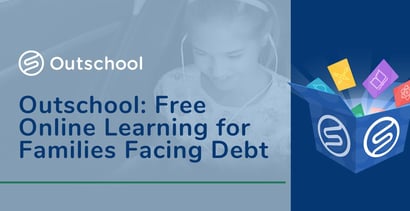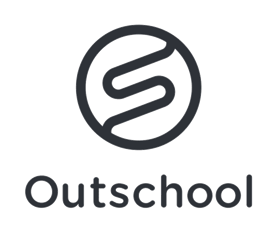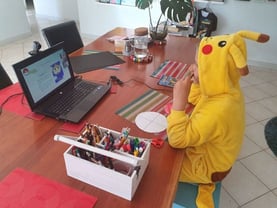
In a Nutshell: Access to quality education — and the technology necessary to receive it — is not equal in the U.S. Outschool is helping to level the playing field with its innovative online learning platform that includes a library of more than 100,000 live online classes. The company also launched Outschool.org in response to the COVID-19 pandemic. This new offering provides free classes to students whose families are experiencing financial hardships. Outschool also provides monetary support to learning centers that focus on underserved children and partners with community organizations to deliver its classes effectively.
While the U.S. may strive to be a nation of equal opportunity, the reality is that many children never truly have a chance to succeed because of inequitable access to quality education. Racial minorities and low-income households facing significant debt are among the groups that are often overlooked when it comes to education.
 According to the U.S. Department of Education, 45% of schools with high poverty rates actually received less state and local funding than did other schools in their districts. While these problems are acknowledged, there is still plenty of work to be done to correct this problem.
According to the U.S. Department of Education, 45% of schools with high poverty rates actually received less state and local funding than did other schools in their districts. While these problems are acknowledged, there is still plenty of work to be done to correct this problem.
Access to the internet and a working computer is also essential in today’s learning environment. Families who live paycheck to paycheck or face large amounts of debt can’t afford to purchase modern computers. And internet service is seen as a luxury. Some rural areas still don’t even have dependable internet.
The federal government may be working to address these issues, but private companies like Outschool are doing their part to innovate in the online education space.
“Outschool is the largest marketplace of live online classes for kids,” according to the company. “We connect learners, parents, and teachers to create interest-based, small-group learning experiences that take place over video chat.”
Outschool.org’s Executive Director Justin Dent recently sat down with us to discuss the innovative online learning platform, its relevance during the COVID-19 pandemic, and how it’s helping children from families in need gain access to technology and education.
Creating a Marketplace of Live Online Classes for Kids
Dent said Outschool was founded in 2015 and launched its first classes in 2017.
“Its primary goal at the time was to provide homeschoolers new and different options to educate their kids,” he said. “Interestingly, it actually started in person. The founders have actually led tours around San Francisco for parents and their kids.”
It didn’t take long for the founding team to realize that focusing on the digital platform was the way to go.

Justin Dent is the Director of Outschool.org.
“Among homeschoolers, there is a high demand for new and diversified educational content options,” Dent said. “And that’s kind of how the Outschool that you see today was born.”
While secular homeschoolers were the initial focus of Outschool, the company soon noticed that families with children in brick-and-mortar schools were supplementing their educations with the platform’s interest-based classes.
“Today, Outschool offers a library of over 100,000 live online classes,” according to the company. “Learners can take core subjects like math, reading, and science, as well as interest-based topics you won’t find anywhere else like Spanish with Taylor Swift, LEGO Engineering, or Pet Reptile Social Hour. With a community of families and teachers spanning 200-plus countries, Outschool provides safe, social fun learning experiences unlike anywhere else in the world.”
Outschool is not only good for children, but it also benefits teachers.
“Teachers on Outschool get to focus on what they do best: teaching classes about topics they love,” according to Outschool. “Because Outschool handles enrollments, record keeping, and many of the other tasks that traditionally take up a teacher’s time, Outschool teachers get to focus all their energy on delivering exciting lessons to their learners.”
Providing Free Classes for Families Facing Hardship
Since Outschool is an online-based learning platform, the company found itself in increasing demand at the onset of the COVID-19 pandemic.
“The platform saw a tremendous amount of growth when school closures started to be discussed almost a year ago,” Dent said. “Pretty immediately, the entire team saw that Outschool was going to be a huge resource for families at this moment.”
That’s when the company launched Outschool.org. Dent said the Outschool team quickly realized, with the influx of new traffic to the website, that many learners who needed educational resources the most were the ones who couldn’t necessarily afford them. These families may have been struggling before the pandemic and the economic downturn only made things worse. In some cases families who were already in debt had to go further in debt just to get by.

Outschool offers an efficient and accessible platform to facilitate online learning.
The company also launched its teacher training programs around the same time to quickly get teachers who had never taught in a virtual setting up to speed.
“Today, too many barriers prevent every kid to develop a passion for lifelong learning. Our mission is to break these walls by giving families and communities access to a global community of teachers and learners for fun and social learning experiences,” according to Outschool.org.
The company believes that, by giving kids the ability to learn what they love, they gain the power to change the world and their community for the better.
A major component that differentiates Outschool.org from its original counterpart is the financial assistance offered to families who may be struggling with debt and other financial hardships.
Outschool.org not only provides free classes to students in these families, but it also provides monetary support for learning centers that help low-income learners. Additionally, Outschool partners with schools and other community organizations to deliver full-time remote learning opportunities to those underserved households.
“Since March, we’ve made $2,500,000 worth of classes available for free to families and communities in the U.S. who are facing financial hardship,” according to the company. “With support from donors, we can help more families in need.”
Customizable Curricula and Interest-Based Learning
Whether students are using Outschool as a supplement to their other educational outlets or using it as a full-time remote learning resource, the company makes it easy for children to get the education they need and explore subjects they are interested in.
“It’s primarily geared toward individuals,” Dent said. “The groups are small group classes, which means there are always less than 18 learners coming together from anywhere in the world to take the same class.”
This small group setting allows the children to receive the attention they need and deserve, and they get to virtually meet others with similar interests.
“Kids learn best when they are interested in the subject. By offering thousands of choices for high-quality classes, there is a class for every interest,” according to Outschool. “Learners can explore new passions, encounter new perspectives, and build new skills by enrolling in classes with peers who share similar interests.”
Social interactions dropped off dramatically when the pandemic swept across the world. And Outschool’s efficient online model helps to alleviate some of the isolation many may be feeling through these challenging times.
“By connecting learners with engaging teachers, online learning can be active, interactive, and fun!” according to the company. “Our classes take place live over video chat, are led by our community of passionate teachers, and allow learners to interact over text, audio, and video — however they’re most comfortable.”
The students are able to form real friendships with other Outschool learners as they expand their knowledge and build skills together.
With its wide variety of classes and efficient delivery methods, Outschool has proven to be a valuable resource for learners from all backgrounds through the COVID-19 pandemic, and beyond.




